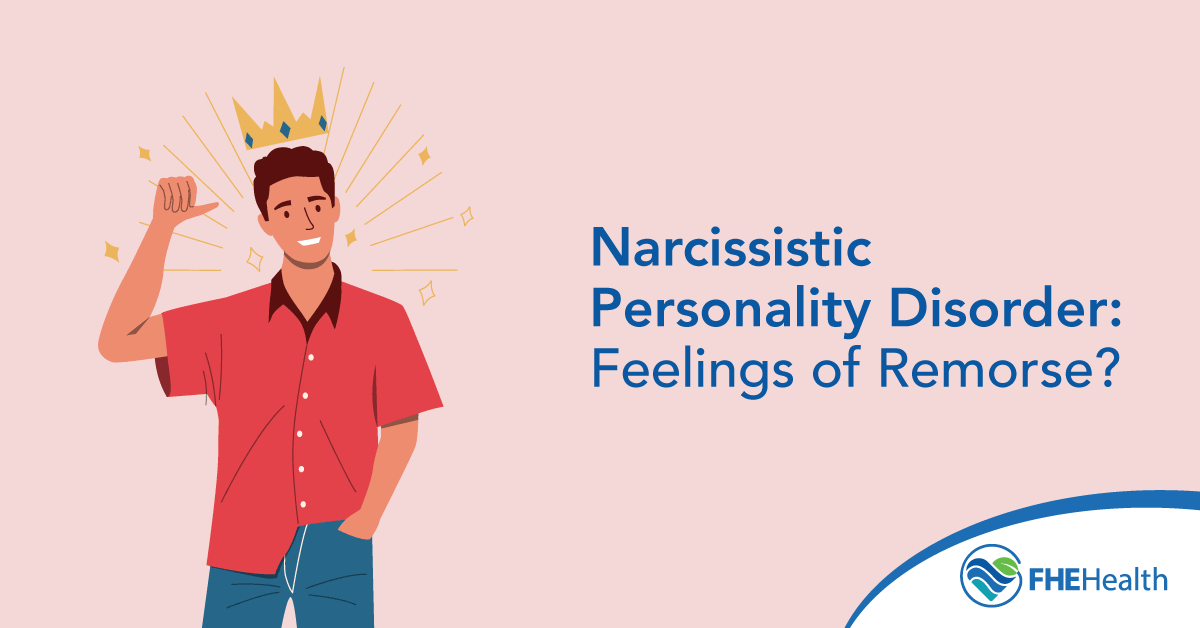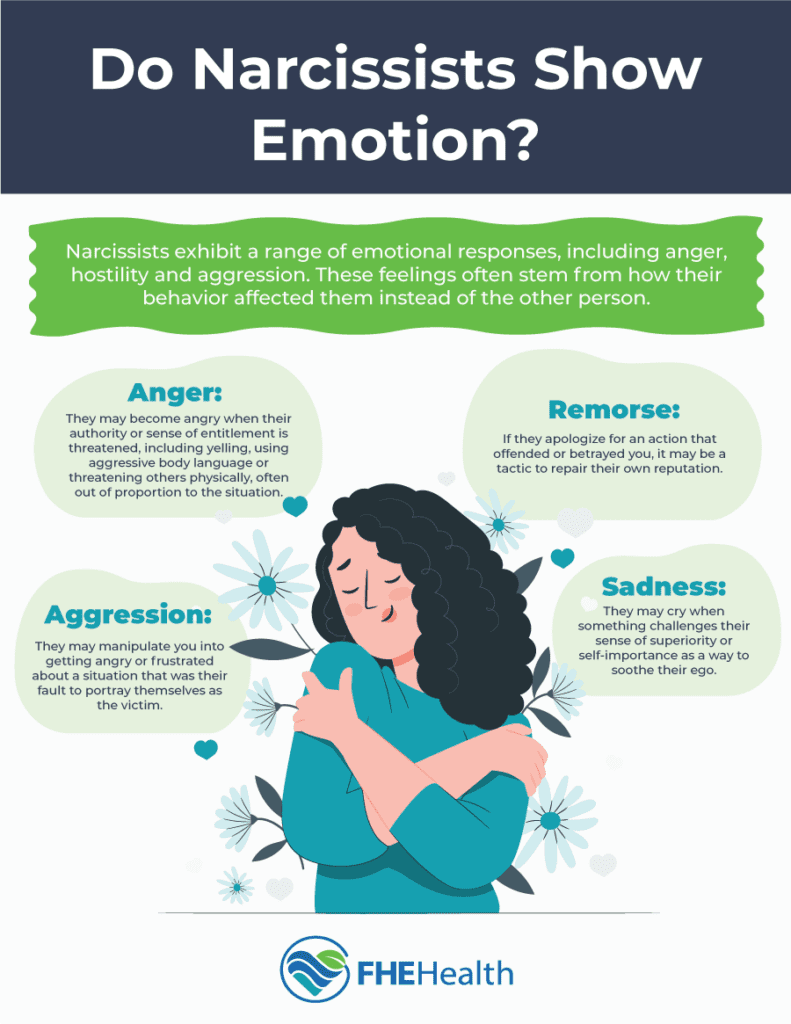
Narcissism refers to a personality style that involves being self-centered and prioritizing one’s needs, often at the expense of others. Someone with narcissistic traits may lack empathy and compassion, making them difficult to be around. But do narcissists ever feel bad about their behavior toward others?
It depends on the person. Narcissism is a spectrum, ranging from feeling self-important due to one’s accomplishments to having a diagnosable narcissistic personality disorder. But displaying narcissistic traits doesn’t necessarily equate to lacking regret, shame or remorse.
Understanding common misconceptions about narcissists and how to navigate their emotional responses can help you build a healthier relationship with a loved one.
Common Misconceptions About Narcissists
Narcissists are often seen as master manipulators who never show remorse or apologize. Common symptoms of NPD include showing an exaggerated sense of self-importance, dismissing the feelings of others and reacting aggressively to being challenged. However, these traits range in intensity depending on the person. Explore common misconceptions to better understand narcissism.
Myth #1: Every Narcissist Has a Personality Disorder
Narcissistic behavior isn’t a clear sign of a personality disorder. Experts estimate up to 6.2% of the U.S. population has NPD, emphasizing how rare it actually is. To have NPD, a person must exhibit a pervasive pattern of grandiosity and exploitative behavior. Meanwhile, narcissism as a personality trait occasionally interferes with interpersonal relationships, but not always.
Myth #2: Narcissists Can’t Form Close Relationships
Narcissists may struggle to connect with others and form close relationships. Their need for admiration and recognition can feel one-sided, causing interpersonal conflict. However, narcissists feel a range of emotions like everyone else and can be sensitive to criticism. Maintaining healthy communication about emotions and triggers can strengthen the relationship for everyone involved.
Myth #3: Narcissists Enjoy Hurting Others
Narcissists can be cruel and malicious when they feel threatened or attacked. They may engage in manipulative behavior to protect their feelings, even at the expense of others. However, their goal isn’t to hurt the other person but to meet their own emotional needs. Understanding this difference doesn’t excuse their behavior, but it can help make sense of it.
Myth #4: Narcissists Can’t Change
Change is challenging for narcissists, but it’s not impossible. Therapy can help narcissists gain greater self-awareness of how their actions affect others to improve their behavior. That said, it only works if they’re willing to accept that they need help and commit to making behavioral adjustments.
Understanding Emotional Responses to Narcissism
Narcissists exhibit a range of emotional responses, including anger, hostility and aggression. But can narcissists feel remorse, guilt or shame for their actions? They can, but these feelings often stem from how their behavior affected them instead of the other person.
Narcissists may use emotional responses as a defense mechanism to avoid feeling pain or humiliation. Their response depends on the situation. Common examples include:
- Anger. When narcissists feel their authority or sense of entitlement threatened, they may lash out in anger. This includes yelling, using aggressive body language or threatening others physically. The reaction is often disproportionate to the situation, serving to assert control and dominance.
- Betrayal. If you express feeling betrayed by a narcissist’s actions, they may respond with personal attacks instead of apologies. If they do apologize, it may be a tactic to repair their own reputation.
- Crying. Narcissists may cry when something challenges their sense of superiority or self-importance. It serves as a means of coping with the blow to their ego. If you cry in response to their actions, they may engage in mocking or belittling behavior out of anger at being challenged.
- Baiting. Narcissistic baiting refers to provoking emotional responses from others to satisfy a person’s own needs. For example, they may manipulate you into getting angry or frustrated about a situation that was their fault to portray themselves as the victim.
Do Narcissists Ever Feel Bad? Distinguishing Between Genuine vs. Manipulative Behaviors
Because narcissists display emotions differently from others, knowing when they’re being genuine can be difficult. You may worry they’re always trying to manipulate you or incapable of caring about anyone but themselves.
However, narcissism exists on a spectrum. Some narcissists may cry or express guilt or shame to gain sympathy and attention. Other times, those emotions come from a genuine place of pain, frustration or embarrassment, but not how you may think.
For example, if a narcissist loses their job due to harmful or unprofessional behavior, they may feel shame or regret but not because of their actions. They’re likely upset about losing a job that served their own self-interests and fueled their important image.
Do narcissists ever apologize for doing something wrong? They do sometimes. However, the apology may serve as a manipulation tactic to get something in return. They may be seeking a favor or trying to avoid negative consequences. Self-aware narcissists who’ve undergone therapy may be more willing to confront their flaws and admit to wrongdoing.
How to Cope With Narcissistic Behavior in Relationships
Coping with narcissism in a relationship can be challenging. Your loved one may display volatile or unpredictable behavior, but protecting your well-being can minimize emotional damage. Consider the following coping strategies:
- Set boundaries. Narcissists often push boundaries and believe rules don’t apply to them. Clearly communicate what you consider acceptable behavior, and enforce consequences if they violate your boundaries.
- Practice self-care. Prioritize your own needs and practice self-care when you’re stressed or overwhelmed. Participate in hobbies, catch up with friends or distance yourself from your loved one until you calm down.
- Educate yourself. Learn about narcissistic traits and manipulation tactics, such as gaslighting. This can help you better understand your loved one’s emotions, behaviors and thought processes.
- Build a support system. Establish a support network of trusted friends and family to turn to for help. Narcissists may try to provoke feelings of guilt for not meeting certain expectations, such as spending enough time with them. Building a support system may prevent this behavior from harming your mental well-being.
Seek Professional Help
If someone’s narcissistic personality is taking a toll on your mental health, help is available. At FHE Health, we offer a range of therapies and support programs to help you process your experiences and learn healthier coping strategies. Take the first step toward building a more fulfilling life. Contact us today to learn more about our services.







